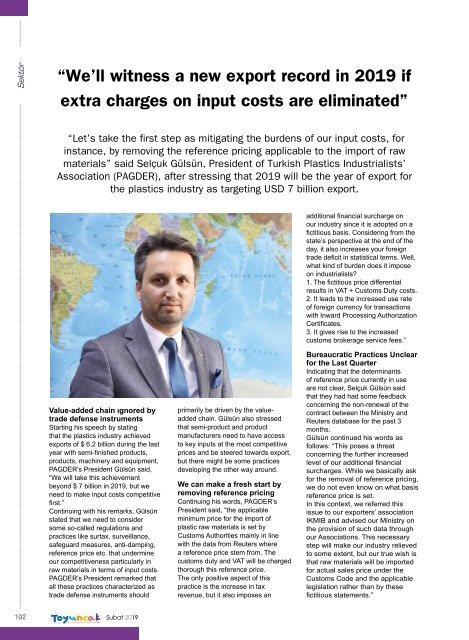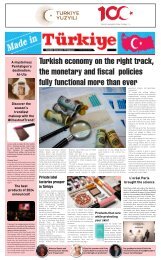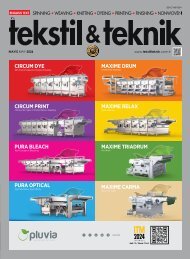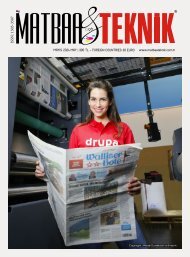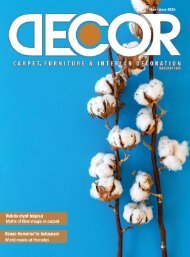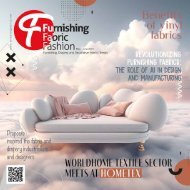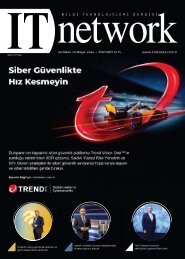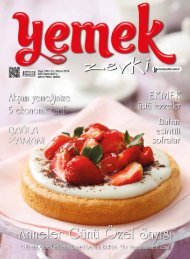You also want an ePaper? Increase the reach of your titles
YUMPU automatically turns print PDFs into web optimized ePapers that Google loves.
Sektör<br />
“We’ll witness a new export record in <strong>2019</strong> if<br />
extra charges on input costs are eliminated”<br />
“Let’s take the first step as mitigating the burdens of our input costs, for<br />
instance, by removing the reference pricing applicable to the import of raw<br />
materials” said Selçuk Gülsün, President of Turkish Plastics Industrialists’<br />
Association (PAGDER), after stressing that <strong>2019</strong> will be the year of export for<br />
the plastics industry as targeting USD 7 billion export.<br />
additional financial surcharge on<br />
our industry since it is adopted on a<br />
fictitious basis. Considering from the<br />
state’s perspective at the end of the<br />
day, it also increases your foreign<br />
trade deficit in statistical terms. Well,<br />
what kind of burden does it impose<br />
on industrialists?<br />
1. The fictitious price differential<br />
results in VAT + Customs Duty costs.<br />
2. It leads to the increased use rate<br />
of foreign currency for transactions<br />
with Inward Processing Authorization<br />
Certificates.<br />
3. It gives rise to the increased<br />
customs brokerage service fees.”<br />
Value-added chain ıgnored by<br />
trade defense instruments<br />
Starting his speech by stating<br />
that the plastics industry achieved<br />
exports of $ 6.2 billion during the last<br />
year with semi-finished products,<br />
products, machinery and equipment,<br />
PAGDER’s President Gülsün said,<br />
“We will take this achievement<br />
beyond $ 7 billion in <strong>2019</strong>, but we<br />
need to make input costs competitive<br />
first.”<br />
Continuing with his remarks, Gülsün<br />
stated that we need to consider<br />
some so-called regulations and<br />
practices like surtax, surveillance,<br />
safeguard measures, anti-damping,<br />
reference price etc. that undermine<br />
our competitiveness particularly in<br />
raw materials in terms of input costs.<br />
PAGDER’s President remarked that<br />
all these practices characterized as<br />
trade defense instruments should<br />
primarily be driven by the valueadded<br />
chain. Gülsün also stressed<br />
that semi-product and product<br />
manufacturers need to have access<br />
to key inputs at the most competitive<br />
prices and be steered towards export,<br />
but there might be some practices<br />
developing the other way around.<br />
We can make a fresh start by<br />
removing reference pricing<br />
Continuing his words, PAGDER’s<br />
President said, “the applicable<br />
minimum price for the import of<br />
plastic raw materials is set by<br />
Customs Authorities mainly in line<br />
with the data from Reuters where<br />
a reference price stem from. The<br />
customs duty and VAT will be charged<br />
thorough this reference price.<br />
The only positive aspect of this<br />
practice is the increase in tax<br />
revenue, but it also imposes an<br />
Bureaucratic Practices Unclear<br />
for the Last Quarter<br />
Indicating that the determinants<br />
of reference price currently in use<br />
are not clear, Selçuk Gülsün said<br />
that they had had some feedback<br />
concerning the non-renewal of the<br />
contract between the Ministry and<br />
Reuters database for the past 3<br />
months.<br />
Gülsün continued his words as<br />
follows: “This poses a threat<br />
concerning the further increased<br />
level of our additional financial<br />
surcharges. While we basically ask<br />
for the removal of reference pricing,<br />
we do not even know on what basis<br />
reference price is set.<br />
In this context, we referred this<br />
issue to our exporters’ association<br />
IKMIB and advised our Ministry on<br />
the provision of such data through<br />
our Associations. This necessary<br />
step will make our industry relieved<br />
to some extent, but our true wish is<br />
that raw materials will be imported<br />
for actual sales price under the<br />
Customs Code and the applicable<br />
legislation rather than by these<br />
fictitious statements.”<br />
102 Şubat <strong>2019</strong>


